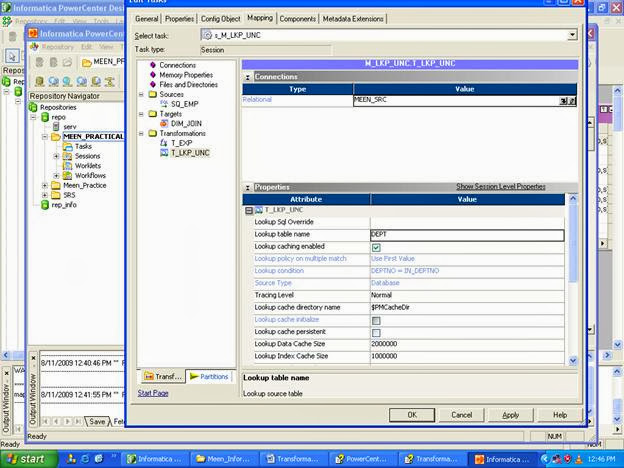- Passive Transformation
- Unlike Connected Transformation that receives input directly from the mapping pipeline, it receives input from the result of an expression in another transformation.
- Acts like a function. An actual parameter is passed to the unconnected lookup transformation. A formal parameter captures that value and returns a value.
 |
| Lookup Transformation |
Create a mapping M_LKP_UNC.
Drag Source (EMP), Target(Dim_JOIN),
From the transformation Menu Create an Expression transformation T_EXP and a lookup transformation T_LKP_UNC.
 |
| Lookup Transformation |
Project the required ports from SQ to T_EXP and add a new port DNAME in T_EXP. Uncheck the Input port.
Edit the Lookup Transformation and add a new port IN_DEPTNO (Formal parameter). Set the datatype,size and precision same as that of DEPTNO.
Check the input port for IN_DEPTNO and return port for DNAME.
Go to Condition Tab and set the condition DEPTNO = IN_DEPTNO.
 |
| Lookup Transformation |
In the Expression Transfromation T_EXP, build a formula in the Expression.
Go to Functions Tab, expand Lookup Folder. Double Click on Lookup Function :LKP.T_LKP_UNC().
 |
| Lookup Transformation |
Go to PORTS tab and pass a parameter by dbl clicking DEPTNO.
:LKP.T_LKP_UNC(DEPTNO).
 |
| Lookup Transformation |
Project the required ports from the EXP to the TGT.
 |
| Lookup Transformation |
Define a workflow WKF_LKP_UNC.
Sepecify three connections:
Source
Target
Lookup (Important) .Since it is an unconnected lookup it is compulsory to assign the Relational Source connection MEEN_SRC here ($Source does not work here). Give the lookup table name.


really nicen explanation.. very helpful... thanks...
ReplyDeleteVery good explanation . Thanks a lot :)
ReplyDeleteThanks a lot! Your Blogs are Overwhelmingly helpful
ReplyDeleteThanks for your nice explanation. But could you pls guide me how to use one lookup is multiple workflows. Any properties setting info if you could share will be highly appreciated.
ReplyDeleteWow gud to see who u correlation with plsql functions
ReplyDeleteWow gud to see who u correlation with plsql functions
ReplyDeleteNice blog thanks for sharing..!
ReplyDeletelooks very informative like to see more. can get more information on informatica here...
ReplyDelete